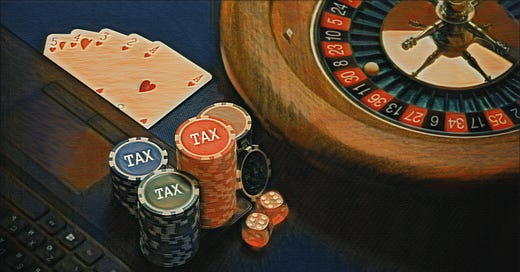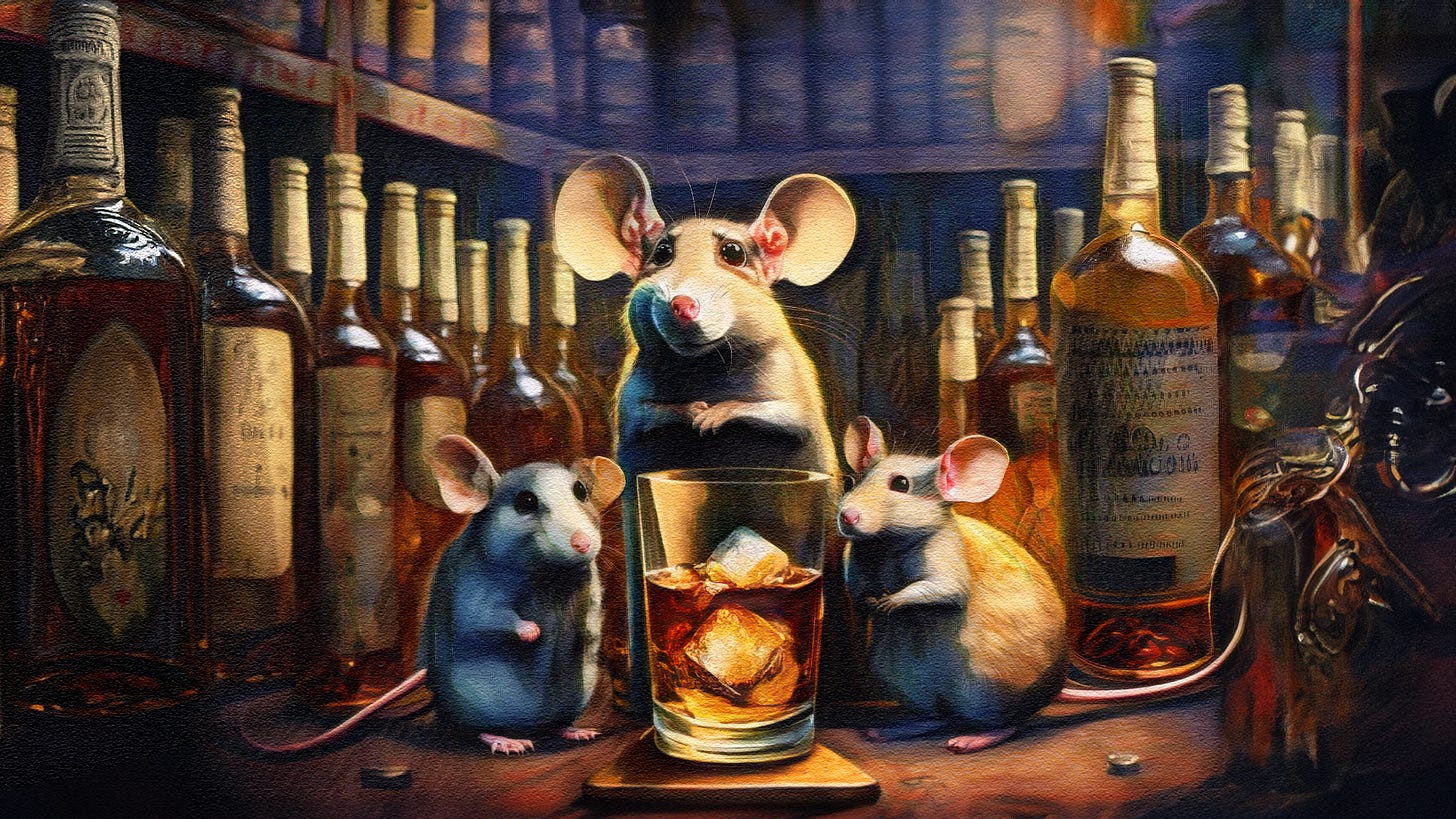Regulating India's Real Money Gaming: Balancing Industry Growth vs. Governance
Examining the recent taxation revision, its implications, and the ongoing debates.
Taxation has always been an essential tool for governance. It has the power to make or break industries, and the Online Real Money Gaming (RMG) sector is now navigating its choppy waters. Recent changes in taxation rules for this sector warrant a closer look into the ongoing tug-of-war between the need for growth vs need for governance.
The cultural timeline of risk-based games in India
Games of stakes have deep cultural roots in India. The Mahabharata revolves around a game of dice that rewrote the fate of kingdoms. Historically, gambling in India was not just for leisure but was often intertwined with festivals and rituals. Diwali card parties are a famous tradition that dates back to the belief that Goddess Parvati played dice with her husband, Lord Shiva, during Diwali.1 It is believed that gambling during Diwali brings good luck throughout the year.
However, British colonial rule in the 19th century brought about strict laws, with the Public Gambling Act of 18672 prohibiting running public gambling houses which is applicable even today. This might have contributed to the prevalent moral stigma and scrutiny surrounding gambling activities. Post-independence, gambling regulations were mostly left to state jurisdictions, leading to a patchwork of laws across the country.
Fast forward to today, RMG sector surged in popularity during the pandemic lockdowns. The online gaming industry in India was projected to reach an astonishing INR 231 billion by FY253. With over 90 million paying users4 and some even pursuing gaming as a profession5, the outlook for the industry seemed very promising. As the lines between leisure, luck, and livelihood grow increasingly indistinct, there's mounting concern for the financial and mental well-being of its participants. Given the addictive nature and substantial financial risks that come with RMG, the call for judicious regulation has never been more urgent.
The Government's Stance on RMG Taxation
The GST council has recently made changes to the RMG tax policy, which includes a 28% tax on Contest Entry Amount (CEA) and a 30% TDS on player winnings6. One of the major concerns is the decision to tax the CEA (Contest entry amount) instead of the Gross Gaming Revenue (GGR). The primary objective of GST is to levy tax on value addition. Real Money Gaming (RMG) was previously categorized as OIDAR, but it is now reclassified with luxury/sin goods such as tobacco and yachts, and equated to gambling, which undermines its value as a technology-centric product. Although CEA taxation may be appropriate for gambling, it is not appropriate for RMG, which primarily offers technological solutions. The proposed policy suggests a lack of nuanced understanding of the industry.
The proposed tax reforms by the government seem to be aimed at generating more revenue. The government stands to gain a 47.78% revenue increase by increasing the Gross Gaming Revenue (GGR) tax from 18% to 28%. On the other hand, by taxing the Contest Entry Amount (CEA) at 28%, it could increase its revenue by a whopping 318.80%. This move is bad news for the RMG industry, which already operates on thin profit margins. Such an aggressive tax structure could render many RMG companies unviable. In the quest for higher revenue, the government may harm the very industry it seeks to benefit from.
Regulating for Responsible Consumption:
Lessons from Alcohol's Regulatory History
"Drink responsibly. Game responsibly. Enjoy responsibly" - These pieces of advice reflect society's aspiration to strike a balance between personal freedoms and well-being. India's history with regulating alcohol can offer useful lessons for developing sensible policies around gaming.
In ancient India, alcohol was part of many rituals and celebrations. Society relied on cultural norms to guide moderate consumption without the need for rigid laws7. The Abkari policy, introduced during British rule to boost revenue, escalated alcohol prices due to taxation. This shift burdened the vulnerable, driving them towards cheaper and often illicit alternatives. These unregulated alternatives were frequently unsafe, leading to severe health issues, addiction, and even fatalities. Moreover, the search for affordable intoxicants pushed many to fall victim to unscrupulous traders and illegal markets, exacerbating crime and further destabilizing already impoverished communities.8
States like Gujarat and Bihar adopted total alcohol bans under Gandhi's influence, who advocated abstaining from alcohol as a means of resisting British revenue-generating tactics. While the bans were well-intentioned, they led to a series of unforeseen consequences. Over time, in places like Bihar, corruption manifested in bizarre ways – there were claims of rats allegedly consuming vast amounts of confiscated alcohol.9 Additionally, these bans paved the way for dangerous, illegal alcohol substitutes.
Goa, in contrast, took a balanced approach. Recognizing the cultural significance of traditional drinks like Feni, they opted for a path that allows traditional industries to continue while integrating sensible modern regulations.10
When we examine India's history of alcohol regulation, we can observe that extreme actions such as imposing high taxes or prohibiting alcohol entirely, frequently result in unintended negative consequences. Conversely, a balanced and well-informed approach generally yields better outcomes - a valuable lesson to keep in mind for devising better gaming policies.
Game of Skill vs. Game of Chance is Not a Useful Debate
The long-standing debate about games has always centered around the difference between skill and chance. Almost every game requires a mix of both factors. For instance, even sports like cricket that are typically considered skill-based are subject to chance-based factors such as weather, pitch, player's form, team dynamics, etc. Most games, including real-money games, do not fit this binary classification. To a beginner, poker may seem like a game of chance but experienced players use complex strategies and skills to win the game.
Frankly, I think this whole debate is distracting and not useful. To develop better policies and ensure the well-being of people who engage in real-money gaming apps, categorizing such games as "Games involving Financial Risks" may be more useful. This allows us to frame problems better, draw insights from similar areas such as mutual funds, and identify ways to protect individuals from financial risks while they enjoy these games. The user base of these games is vast and diverse, ranging from highly skilled players to vulnerable groups such as minors, low-income, and low-skilled players. A good policy for such games is one that protects vulnerable players while allowing responsible adults to engage safely.
Is online poker really all that terrible for society?
Many people have a negative perception of online poker, thinking of it as just a vice or a risky form of entertainment. However, it's much more than that. Online poker is a game that requires critical thinking, strategic foresight, and mathematical prowess, setting it apart from games of pure luck11. It's not just about bets and wagers; the online poker industry drives job creation, fosters technological innovation, and boosts government coffers through tax revenue in regulated regions12. The game's inherent challenges offer valuable life lessons, such as resilience in the face of setbacks, reading human cues, disciplined decision-making, and the importance of financial and time management.13
Despite the advantages, there are also some significant concerns that need to be addressed. Online poker addiction can lead to mental health problems, damaged personal relationships, and financial instability. High stakes can translate into substantial losses, particularly for those who misconstrue online poker as a source of income14. Additionally, minors may be inadvertently exposed to the game online, without fully understanding the implications of playing.15
Online Poker can be both beneficial and risky. However, its societal value depends on its consumption and regulation.
Finding a Middle Ground: Policy Proposals for "Games Involving Financial Risks"
The increasing popularity of "Games with Financial Risks" highlights the need for a balanced and thoughtful policy framework. To reiterate, an effective policy should aim to maintain the longevity of the gaming industry, safeguard its varied user-base, and generate reasonable income for the government. A user-centric policy should prioritize shielding susceptible players while enabling responsible adults to engage safely and securely. Here are some ways to achieve the right balance:
Protecting the Vulnerable:
Age Restrictions: Implement a rigorous verification process to ensure no minors access RMG platforms.
Skill and Income-based Limits: Introduce a tiered system setting deposit and loss limits based on a player's skill and income bracket.
Ensuring Ethical Communication, Design, and Marketing:
Transparent Advertising: Marketing should accurately depict RMGs and not portray them as steady income sources.
Ethical Design Principles: Avoid manipulative elements pushing players into excessive risks.
Mandatory Warnings: Continuously educate and remind users about financial risks, ensuring they are consistently informed.
Rigorous Regulations and Compliance:
Combatting Illegal Platforms: Implement stringent measures against offshore and unregulated platforms.
Balanced Gaming Environment: Establish strict licensing protocols and regular audits, ensuring a responsible gaming ecosystem.
Balanced Taxation:
Taxing on GGR Instead of CEA: Advocate for Gross Gaming Revenue-based taxation, ensuring government revenue without suppressing industry growth.
Rational Tax on Winnings: Introduce a threshold, like taxation on winnings above Rs.10,000.
Support for Small Gaming Enterprises: Offer tax breaks or incentives, championing innovation and diverse market participation.
Tiered Taxation: The more the risk, the more the tax.
Current Impact and Forecast
The new tax model is set to take effect on October 1st, 2023, and it's already significantly impacting the Real Money Gaming (RMG) sector.16 The consequences of this policy change are evident:
Around 500+ professionals have been laid off.17
Three companies have been forced to close down.
The potential for foreign investment has become uncertain.
The RMG industry is expected to face an ongoing economic downturn, which may result in more layoffs and company closures18. While some companies are challenging the policy through legal battles19, the emergence of unregulated platforms may pose a threat to both these efforts and consumer safety. The industry may see market consolidation, which could lead to only a few platforms surviving and the closure of numerous small companies, which comprise 95% of the industry20. This may have a ripple effect on related sectors such as 5G and advertising as well.
The government and private companies may launch public awareness campaigns to promote responsible gaming. Despite the government's decision not to reconsider the policy, they may be compelled to do so in the face of negative impacts and opposition. Multinational companies may hesitate to invest in India if there are ongoing setbacks or legal disputes.
Conclusion
The challenges currently confronting India's Real Money Gaming (RMG) sector underscore a symptomatic disconnect between policymakers and industry stakeholders. However, there are successful examples of collaboration between governments and different sectors of the economy worldwide that we can learn from. For instance, the EU involved key industry leaders when drafting the GDPR, resulting in a well-balanced framework that protected individual rights while ensuring industries implement and adhere to the policy in the long term21. Similarly, Singapore engages in ongoing public-private dialogues to ensure its policies remain forward-looking and grounded in on-ground realities. If India adopts a similar collaborative approach, it could lead to policies that better align with the industry's aspirations and benefit society.
Fin
Ganesh, N. (2012, November 10). Why we gamble during Diwali. Times of India Blog. https://timesofindia.indiatimes.com/blogs/treasurehunt/why-we-gamble-during-diwali/
Singhania, V. (2021, June 8). A general introduction to gambling law in India. Lexology. https://www.lexology.com/library/detail.aspx?g=3c73b277-c25e-4883-a152-a47e1040f4f2
Gaming Industry in India – Invest in Gaming Companies. (n.d.). Invest India. https://www.investindia.gov.in/sector/media/gaming
Nag, A. (2023, May 12). Game on – The expanding gaming industry in India. Times of India Blog. https://timesofindia.indiatimes.com/blogs/voices/game-on-the-expanding-gaming-industry-in-india/
Chatterjee, A. (2022, April 4). Connect, compete, earn: How Covid lockdowns set Indian gaming industry on path to $2 bn by 2023. ThePrint. https://theprint.in/economy/connect-compete-earn-how-covid-lockdowns-set-indian-gaming-industry-on-path-to-2-bn-by-2023/898553/
GST Council Meet 2023: GoM decides to levy 28% GST on online gaming, horse racing, casinos. (2023, July 11). Moneycontrol. https://www.moneycontrol.com/news/business/economy/gst-council-meet-28-gst-to-be-lives-on-online-gaming-horse-racing-casinos-10940171.html
Somasundaram, O., Raghavan, D. V., & Murthy, T. (2016, January 1). Drinking habits in ancient India. Indian Journal of Psychiatry; Medknow. https://doi.org/10.4103/0019-5545.174396
On Drinking and “Drunkenness”: History of Liquor in Colonial India on JSTOR. (n.d.). https://www.jstor.org/stable/4403218
Correspondent, H. (2018, December 29). ‘Rats drank it’: Cops as 1,000 litres of seized liquor disappears from police station. Hindustan Times. https://www.hindustantimes.com/india-news/rats-drank-it-cops-as-1-000-litres-of-seized-liquor-disappears-from-police-station/story-29vyjzzRCsYj2RjAP0gBdO.html
‘Will save Goa’: Feni industry hails govt’s policy for heritage drink. (2021, September 24). The Indian Express. https://indianexpress.com/article/cities/goa/will-save-goa-feni-industry-hails-govts-policy-for-heritage-drink-7530652/
Parke, A., Griffiths, M. D., & Parke, J. (2005, September 1). Can playing poker be good for you? Poker as a transferable skill. Journal of Gambling Issues; Centre for Addiction and Mental Health. https://doi.org/10.4309/jgi.2005.14.12
Research, Z. M. (n.d.). Online Poker Market Size, Share, Growth, Trends, Demand 2030. Zion Market Research. https://www.zionmarketresearch.com/report/online-poker-market-report
Parke, A., Griffiths, M. D., & Parke, J. (2005, September 1). Can playing poker be good for you? Poker as a transferable skill. Journal of Gambling Issues; Centre for Addiction and Mental Health. https://doi.org/10.4309/jgi.2005.14.12
Tiwari, A. K. (2023, July 20). In India, fantasy gaming is causing addiction and financial ruin. Business and Economy News | Al Jazeera. https://www.aljazeera.com/economy/2023/7/20/in-india-fantasy-gaming-is-causing-addiction-and-financial-ruin
Tiwari, A. K. (2023, July 20). In India, fantasy gaming is causing addiction and financial ruin. Business and Economy News | Al Jazeera. https://www.aljazeera.com/economy/2023/7/20/in-india-fantasy-gaming-is-causing-addiction-and-financial-ruin
Sarkar, G. (2023, August 2). Online Gaming: 28% GST To Be Implemented From Oct 1, To Be Reviewed After 6 Months. Inc42 Media. https://inc42.com/buzz/online-gaming-28-gst-to-be-implemented-from-oct-1-to-be-reviewed-after-6-months/
Upadhyay, H. (2023, August 26). 28% GST on online real money games: 3 layoffs, 3 shutdowns, what’s next? Entrackr. https://entrackr.com/2023/08/28-gst-on-online-real-money-games-3-layoffs-3-shutdowns-whats-next/
Online gaming industry looking at layoffs, hiring pause after 28% GST move. (2023, August 22). Moneycontrol. https://www.moneycontrol.com/news/business/online-gaming-industry-looking-at-layoffs-hiring-pause-after-28-gst-move-11236201.html
Online gaming companies, associations write to Centre to reassess 28% GST: Report. (2023, July 15). Business Today. https://www.businesstoday.in/tech-today/news/story/online-gaming-companies-associations-write-to-centre-to-reassess-28-gst-report-389869-2023-07-15
Telecom, E. (2023, August 3). 28% GST on online gaming sector to hit FDI inflows, cut demand for 5G: BIF. ETTelecom.com. https://telecom.economictimes.indiatimes.com/news/internet/28-gst-on-online-gaming-sector-to-hit-fdi-inflows-cut-demand-for-5g-bif/102387942
Gooch, Peter (2018). "A new era for privacy - GDPR six months on" (PDF). Deloitte UK. Archived (PDF) from the original on 12 October 2020. Retrieved 26 November 2020.






